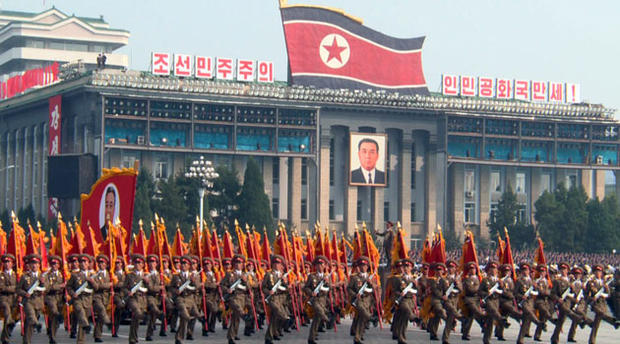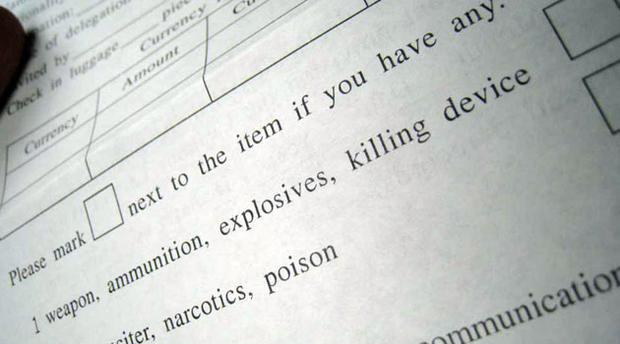Covering the News In North Korea
Randy Schmidt is a cameraman and editor for CBS News based in Tokyo
"Pack your equipment, we're going to Pyongyang" my producer Marsha Cooke tells me over the telephone.
Following a vacation, it's my first day back to work at the CBS News Tokyo Bureau, where I am based as a cameraman and editor, covering Asia. The thrill of working in the network news business is when you receive a phone call such as this, often in the middle of the night, throwing your next week or so into disarray as you scramble to get on a flight to a foreign country to embark on an adventure with no itinerary. Last year, a phone call sent me to the jungles of Sumatra, covering an earthquake. The year before, it was Mumbai, India, for a deadly terrorist attack and also Sichuan, China, for another devastating earthquake which killed 80,000.
To get to Pyongyang, North Korea, I must first fly to Beijing, where I meet up with Marsha and New York-based CBS News correspondent Jim Axelrod, who just flew in, jet-lagged by 12 hours. That night, before our flight to Pyongyang, a totally different story arises (about imprisoned Chinese Nobel Peace Prize winner Liu Xiaobo) which keeps us up until 4 a.m. Very little sleep later, on Oct. 9, 2010, we board our flight for Pyongyang on a rickety old Russian-built plane operated by Air Koryo, North Korea's National Airline.
"Where are you from?" the North Korean flight attendant asks me.
"I'm American, but I live in Japan."
"I hate America! I hate Japan! What would you like to drink today, sir?" she said.
The comment is not personal. North Koreans are schooled to believe that America and Japan are enemies, but that hatred is directed at the governments of those countries, not at individuals.
North Korea: Surreal Land of the KimsA hundred other foreign journalists (TV, print, radio, Internet) are also on the plane, invited by the North Korean government in a rare thawing of foreign access to the Hermit Kingdom. CBS News went to Pyongyang 5 years ago for 60 Minutes. Marsha Cooke, correspondent Barry Petersen, and I went in February 2008 when the New York Philharmonic Orchestra was invited to perform in Pyongyang. This assignment now, however, would prove to be much more exciting and spectacular than my previous visit.
The occasion is both the 65th Anniversary of the founding of the nation's ruling Workers' Party, coupled with the announcement of third son Kim Jong Un as heir apparent to his Dear Leader dad Kim Jong Il, who took over the reigns from his Great Leader father, founder Kim Il Sung, who died in 1994. We assume that we will be able to attend one of North Korea's massive military parades, but beyond that, we have no idea what we will be able to see or do or how exactly we will be able to get our stories on TV in the United States.
I sometimes look at covering an assignment like this as similar to being contestants on a reality TV show like "The Amazing Race." Small teams of two or three are dropped into a foreign country with no air ticket out. Cell phones and Blackberries are confiscated. Customs forms ask how many "Killing Device(s)" we are carrying.
We're assigned government minders who are sometimes helpful and sometimes a roadblock preventing us from doing what we want. Internet access is supposed to be provided at our hotel but it rarely works. We can make international phone calls from the hotel (something which average North Korean citizens are not allowed to do), but the cost is exorbitant. The challenge for Team CBS is to shoot, produce, and write a couple stories a day and get the video and audio to New York. The winners are the teams that get their work out there and have a chance to show the world a rare glimpse inside the Democratic People's Republic of Korea.
With the time difference, the CBS Evening News is on at 7:30 a.m., CBS Sunday Morning is on at 10 p.m., and The Early Show is on at 8 p.m. That means working all day and night, eating sporadic meals, and taking cat naps when possible for the next few days until the story blows over. A hundred things can go wrong that will prevent you from getting these stories to New York. Our job is to make sure they get there and get on the air.
Our two minders, Mr. Hwang and Mr. Kim, seem to be spoon fed information by their unseen minders, so we never really know the day's schedule beyond the next few hours, if even that. After our arrival, we speed through town in a van, driving much too fast to shoot proper video out the window. Requests to slow down are denied. And with virtual no other cars on the streets, we don't stop at intersections.
We arrive at our destination: a huge stadium where we wait for about an hour, unsure of what exactly we will get to see once we are allowed to entire the stadium. After a thorough security check, we find ourselves in for a very special treat. We are about to witness North Korea's Arirang Mass Games celebrations, featuring tens of thousands of singers, dancers, musicians, and acrobats performing in front of a giant mural made up of about 20,000 students holding up multi-colored cards (like pixels on a TV set), turning them over and over, creating a hundred different images throughout the evening - images of Great Leader Kim Il Sung, of weaponry, of children, of Communist propaganda statements.
I have seen glimpses of these shows in documentaries like A State Of Mind (2004) - but nothing compares to seeing it in person. Wow! The precision and talent and synchronicity are jaw-dropping, with each performance topping the previous one. And best of all, much to everyone's surprise, including our minders', King Jong Il and his heir apparent son Kim Jong Un are there in attendance.
The next day, we are taken to what will be North Korea's largest military parade ever, again featuring tens of thousands of personnel. Marching women with machine guns is what most catches my eye! Because we arrive at the end of their full dress rehearsal, I'm allowed to shoot video while marching alongside the troops and in front of them as they goosestep toward me. I feel like I've been transported to the set of Leni Riefenstahl's fascist propaganda documentary Triumph of the Will (1935) about Hitler at the height of popularity holding a mass Nazi rally in Nuremberg. It's frightening yet spectacular.
After returning to our hotel, I now have two and half hours worth of video from the Mass Games show and from the Military Parade. The idea is to shoot everything as tightly as possible, but at the same time, it's such a rare opportunity to be here that it's a shame to not shoot as much as possible. Unfortunately, we only have a ten-minute time slot from which to send out our video via satellite from a special hook up at our hotel. I'm able to send correspondent Jim Axelrod's voice tracks and a few select short video shots over the Internet, but I must be highly selective as to what video I can send to New York for our immediate stories.
The following day we finally have a chance to go out on the streets of Pyongyang, though under the guidance of our minders who still maintain control over what we are allowed to see and do. Finally, we are able to talk to interview a couple of people - but only those who are approved by our minders. Next, we visit the giant statue of Kim Il Sung which overlooks the city. Many citizens visit the statue dressed up in their best clothes, leaving flowers at the foot of the statue and then bowing down before it with awed and humble respect. I was very surprised to see a tour group including a visiting foreigner (presumably from Australia), who was wearing a baseball cap, Hawaiian shirt, short pants, and sandals, and who was speaking very loudly. I was surprised that the authorities allowed him to visit the statue dressed like that as they have very strict rules about such things...at least they did in the past. I asked Mr. Hwang about this, and he responded, "We respect the cultures of others, even if they do not respect our own."
Incidentally, unlike most North Koreans, our minder Mr. Hwang has had the privilege of travelling to many places around the world. He's been to New York, Mississippi, and Hollywood. I asked him if he enjoys American movies and TV shows, and he responded that he likes the Chuck Norris TV show Walker, Texas Ranger.
Having secured our return air tickets to Beijing, we wrap up our last story at 4 a.m. on Oct 12, set our alarms for 5:30 a.m., and head for Pyongyang airport. Despite obstacles, everything worked out quite well, and we got four stories on four different CBS News shows. These type of assignments are what we live for in the news business. They challenge you every step of the way, forcing you to think of every conceivable contingency and then even still to roll with the punches. And with each such assignment, we're better prepared for the next.


